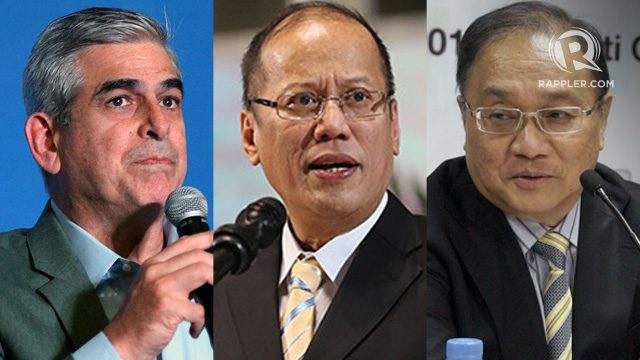SUMMARY
This is AI generated summarization, which may have errors. For context, always refer to the full article.

MANILA, Philippines – The Philippines has finally roared after trailing behind the region’s tiger economies, with the businesses of Manuel V. Pangilinan and Jaime Augusto Zobel de Ayala benefitting the most.
Over the last 6 years, Pangilinan’s conglomerate’s net income consistently leaped, his telecom business survived a rapidly-shifting digital space, and his mining company thrived despite lower gold prices.
Likewise, Zobel de Ayala’s real estate, telecommunications, and power generation businesses performed generally well during President Benigno Aquino III’s time.
A stock analyst who closely monitors their businesses said this is mainly because of an administration that is a bit hands-off to the private sector.
MVP and Aquino

Pangilinan – chairman of Metro Pacific Investments Corporation (MPIC), PLDT Incorporated, and Philex Mining Corporation – saw a relatively positive business climate under the Aquino administration.
“Businesses generally performed well over the past 6 years, mainly because the President did not micromanage, which creates a positive business environment,” Alexander Adrian Tiu, senior equity analyst at AB Capital Securities Incorporated, said in a phone interview. “He’s a bit laid back when it comes to the private sector.”
Pangilinan’s infrastructure conglomerate MPIC managed to grow its net income to P9.5 billion in 2015, from P3.86 billion in 2010. (READ: MPIC to Duterte admin: Let’s start with a clean slate)
“MPIC is very consistent throughout Aquino’s term. They did not report a declining net income in the past 5 years. This is despite a water arbitration, a long-due toll hike, and a pending water tariff hike,” Tiu said.
MPIC had filed separate arbitration cases against regulators under Aquino’s watch for refusing to implement water and toll rate adjustments, as promised under existing contracts.
For MPIC’s water and roads units, claims are going up all the time.
Its water unit’s claim is heading towards P7 billion, and for the roads, it is in the north of P4 billion by the end of the year.
“But despite all these regulatory setbacks, MPIC, like other private companies, still sees the glass half-full,” AB Capital’s Tiu said.
“They still bid for public-private partnership (PPP) projects despite these hiccups,” he added.
For telecom giant PLDT, the stock analyst described its performance as a “roller coaster ride.”
In 2010, PLDT reported a net income of P40.2 billion. But in 2015, it slid to P22.1 billion.
Tiu said Aquino’s policies are not to blame. “In fact, him being a bit hands-off created a positive business climate,” Tiu said.
The declining profits of PLDT is more because of legacy businesses, like voice and SMS, becoming obsolete, he added.
To ride the digital wave, Pangilinan is projecting PLDT’s core net income this year to be the lowest since 2003.
“In that light, we do have to reset the profitablity and cash flow profiles of the group to a new baseline starting 2016. Guidance for core earnings has been reset significantly from P35 billion ($737.52 million) in 2015 to P28 billion ($590.01 million) in 2016,” Pangilinan said.
Meanwhile, Philex Mining, the country’s biggest gold producer, saw its net income surge by 10% in 2015, with tight expense management and cost reduction programs cushioning the impact of low metal prices.
Aquino’s issuance of Executive Order (EO) 79, also known as the Aquino administration’s mining policy, did not help; but the lower metal prices was the main reason for the company’s declining revenues, an analyst said.
EO 79 has barred the grant of new mining contracts pending the passage of a measure on revenue sharing between the government and mining companies. It also cut mining contracts’ term to 25 years from 50.
“That has affected future prospects, but it did not really affect current output. The main reason is that gold prices fell,” Tiu said.
Ayala and Aquino

Just like MVP, the Ayalas’ businesses also performed well during Aquino’s watch.
The family’s holding company, Ayala Corporation, saw its net income more than double in less than 5 years.
Its net income surged to P22.3 billion in 2015 from P11.2 billion in 2010, anchored on the strong performance of its real estate, telecommunications, and power generation businesses.
Ayala Land’s net income skyrocketed to P17.6 billion in 2015, from P5.4 billion in 2010, thanks to the increasing demand for real estate nationwide.
The Ayala-led Globe has been able to capitalize on the growth of mobile connectivity and Internet, while PLDT is just playing catch-up on the mobile connectivity phenomenon, Juan Rafael Supangco, former head of research at Angping & Associates Securities, Incorporated, had said.
Unlike PLDT, Zobel de Ayala’s telecom company did not see its net income slide in the past few years. (READ: PH telcos, TV networks ride double-edged digital wave)
Globe’s net income even surged to P16.5 billion in 2015, from P9.7 billion in 2010.
The Bank of the Philippine Islands, meanwhile, saw its net income increase to P18.2 billion in 2015, from the P11.3 billion in 2010.
Manila Water Company, Incorporated’s net income was at P3.99 billion in 2010 and grew to P6 billion by 2015.
“We achieved a number of milestones as a group in the past year, with most of our major businesses continuing to perform well,” Ayala president and COO Fernando Zobel de Ayala said.
Zobel de Ayala added that power and infrastructure investments contributed to the conglomerate’s financial success.
The conglomerate won most of the big-ticket PPP deals, namely: Daang Hari-SLEX Link Road (Muntinlupa-Cavite Expressway), Automatic Fare Collection System, LRT Line 1 Cavite Extension and Operation & Maintenance, and South Integrated Transport System Project under Aquino’s watch.
Although these two business giants made the most of the economic gains under the Aquino administration, the country’s growth has not been fully inclusive, as poverty and inequality remain entrenched.
The Philippine economy has been growing at an average of 6.5% for the past 5 years, but the country continues to have high unemployment and underemployment rates.
For Zobel de Ayala, the “tone has been set for the need to be inclusive.” Pangilinan, for his part, said, “The next President will inherit a stellar economy.” – Rappler.com
The economy is looking bright — and there’s no better time to hustle. Click here to check out the best jobs in sales and marketing on the Rappler x Kalibrr job board.
Add a comment
How does this make you feel?
There are no comments yet. Add your comment to start the conversation.